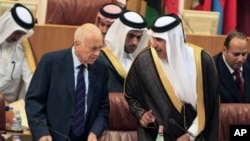The Arab League is calling for urgent measures to end the violence in Syria. But talk of sanctions and other diplomatic moves are being overshadowed by reports that military defectors staged a high profile attack on a Syrian military base.
Arab foreign ministers kept up their criticism of the Syrian government for failing to end its violent crackdown on dissent. Qatari Foreign Minister Hamid bin Jassim al-Thani, who has spearheaded efforts against Syria, said what has happened is very sad.
|
A Look At Syria's Main Opposition Groups
|
He said the league cannot accept that people are being killed in the way they are now, and that members are moving to stop the bloodshed.
But according to anti-government activists, the violence escalated Wednesday, in part from the opposition. Military defectors are reported to have launched a series of attacks, including an assault on an intelligence base outside Damascus.
Members of the Free Syrian Army are said to have fired machine guns and rockets on the intelligence complex, the sounds heard by Western diplomats in the capital.
Syrian state media, which previously highlighted attacks on security personnel, made no immediate mention of the attack.
The assault is one of the biggest the group has made, and comes after members announced a temporary military council, led by defecting colonel Riad al-Asaad.
The armed approach puts them at tactical odds with the main opposition groups, the Syrian National Council and the National Coordination Committee.
Syria analyst Nadim Shehadi, of London-based Chatham House, indicates armed resistance could undermine the assumptions being used to isolate the Syrian government.
"The dominant opposition narrative is still that of a non-violent and peaceful protest, and the regime narrative is the story of doom and gloom and violence and sectarianism and all that after the regime falls," said Shehadi. "Now there will always be incidents of violence, there will be things to indicate that those narratives are not perfect. "
The Arab League earlier this month called for an end to violence, and the release of political prisoners. Syria's government, which calls the league decision to suspend it illegal, notes it has released prisoners, including more than 1,000 people this week.
In other violence Wednesday, Morocco's Embassy in Damascus came under attack by protesters just as the Arab ministers were meeting in Rabat, Morocco to discuss the Syria situation.
But the Arab League has kept up its criticism and has expanded it to another member of the 22-nation alliance. During Wednesday's meeting, Qatar's foreign minister spoke about the anti-government protests rocking Yemen.
Bin Jassim said he was asking Yemen's embattled President Ali Abdullah Saleh to sign a regional agreement on a peaceful transition without delay.
Anti-government protesters staged a huge rally Wednesday in the Yemeni capital calling on the league to suspend Yemen's membership until their demands for Saleh to step down have been met. There have been no indications that the league is seriously considering such a move.
Syria is only the third nation in the League's history to be suspended - Egypt in 1979 for its overtures to Israel, and Libya, earlier this year. Libya's membership was restored after the overthrow of Moammar Gadhafi.




